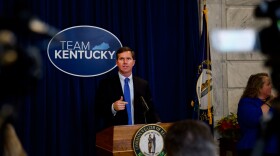Economist Paul Coomes told the Metro Council’s labor and economic development committee on Tuesday that getting back to business as usual won’t happen as soon as the public health crisis ends.
Not only do some economists now predict a two- to three-month recession, consumers may be afraid to return to so-called normal life, Coomes said. He compared fear of the coronavirus to Americans’ collective fear of flying after the Sept. 11, 2001, attacks, saying that changed only after the imposition of strict screening at airports.
“My sense is people will not be completely comfortable going about their old routines, going out to eat, traveling, going to conventions, conferences and all that entails until we implement some public health screening at places of work and places of entertainment and places of shopping,” he said.
That could involve temperature screenings or blood tests, he suggested. But he believes such measures are likely months away.
Coomes said the longer the lockdown situation continues, the more industries will be affected, resulting in more unemployment and further revenue woes for the city, which relies heavily on occupational fees for its budget.
That impact will likely be greater in the next fiscal year that starts on July 1, Coomes said. He declined to give an estimate of the size of that impact. He told WFPL News last week he thought it might be about $18 million.
“We’ve never had anything like this. There’s no data to look back on. There’s no case that we can refer to,” Coomes said. “We just have to use our common sense and our training to give you the best estimate.”
He said it could be six months or more before Louisville’s economy rebounds to the level it was at in February. New figures released by the Revenue Commission on Tuesday indicated collections were up compared to the same time last year.
Coomes pointed out those figures do not include March, when the shutdown period began. A clearer understanding of its impact on Louisville’s economy will be available in next month’s report. That will come after Mayor Greg Fischer gives his initial budget proposal on April 23.
Fischer has called on the federal government for more direct support for Louisville and other cities suffering lost revenue at this time. He is warning of major cuts to jobs and services without such funding.






